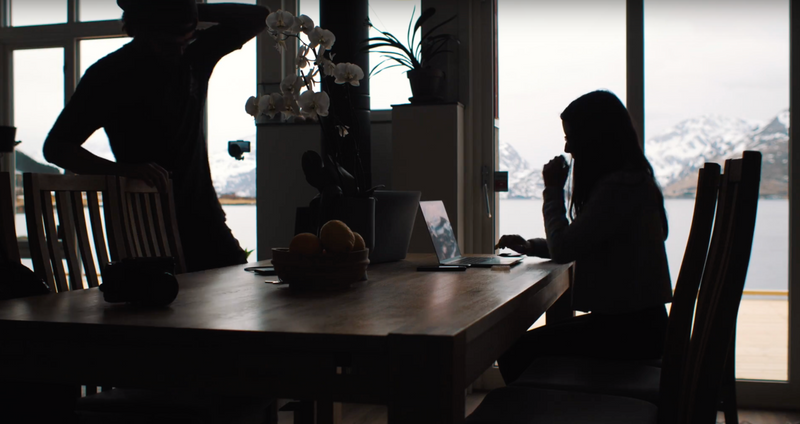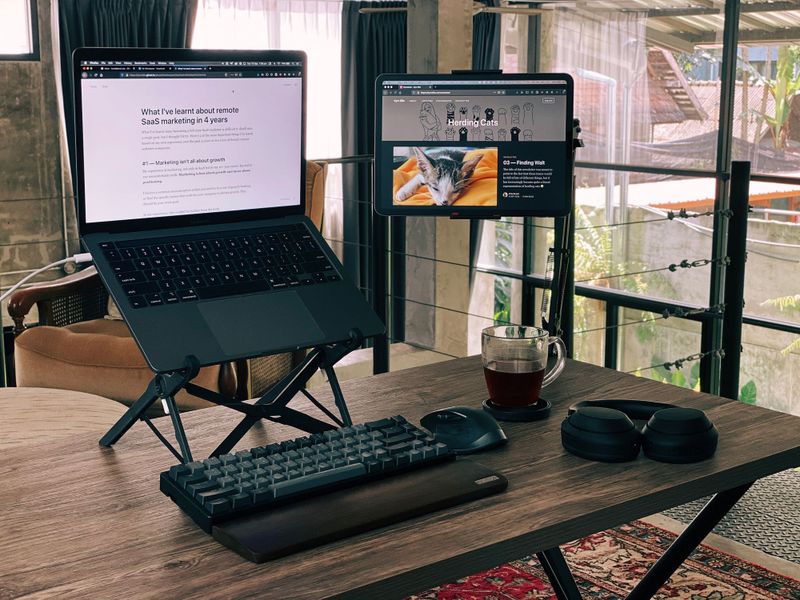One of the most common questions I get asked by friends and acquaintances is "so how did you get a job that allows you to travel like this?"
Answer: It's complicated.
Sometimes I get asked this question by people who are serious about doing it themselves, but unsure where to start. That used to be me. Early in my marketing career, I knew that I wasn't suited to strict routine, commuting, offices and British weather. I also knew there was another way. I just didn't know how to get there, and it felt unbearably overwhelming. A friend of mine aptly described this: "the fear of how much unknown work lies ahead is paralysing me".
I used to spend my daily commute in an existential crisis, and it sounds like I'm exaggerating because I am, but also I'm not. I fucking hated it and everything it represented. Renting a house in a place I don't even want to live, to be closer to the office that I'd sit in endless traffic to get to, in a car that I only pay for to get to said office. You know the drill. Yes, I'm a millennial, don't @ me.
After several years of contemplating going freelance while keeping a close eye on this exciting new concept of a remote job, I finally made it. I spent much of that time feeling like I never would "make it", but I did. I managed to convince someone to take a chance on me – a chance that would go on to change my life (not exaggerating). A lot of this was down to my own determination and planning, and much of it was down to the help of friends and colleagues around me. I certainly didn't do it alone.
So, I've decided to share my thoughts about why and how to get a (good) remote job in marketing. This draws on insights from my own experience, from hiring people to join my team, and from speaking to others who work and hire in this space. Hope you find it useful! 🦄
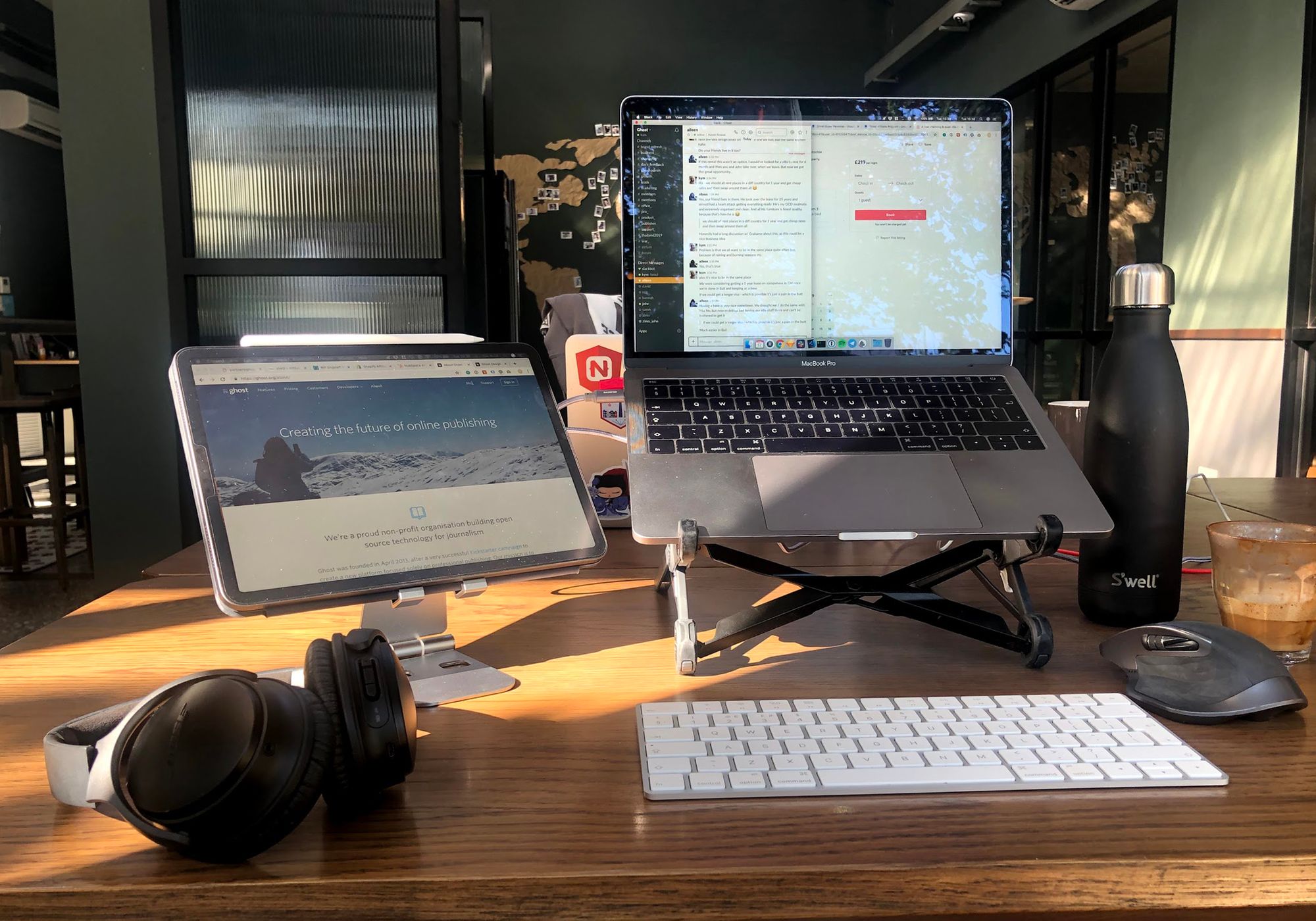
I wrote this for people who have a genuine interest in working remotely in marketing. I often write about travel as well - but the two aren't mutually exclusive. Working remote affords you a huge amount of lifestyle decisions that working in an office does not. Part of this process is discovering what those decisions are for you.
A remote job is a lifestyle choice
I've seen a lot of people saying that working remote shouldn't be your ultimate and most important end-goal. Instead you should look for the right role at the right company. While that would be nice, if working remote is important to you for [insert reasons*] then you'll need to approach it as such. Truly remote jobs still represent a small percentage of the job market, so don't feel bad for being rebellious and chasing your ambitions. Just make sure you have good reasons!
*I've got reasons for you
We'll take a deeper look at how to apply for jobs in a competitive market in a moment. But first I thought it would be useful to go over some tips to identify where your desire to work remote actually comes from.
I love contradicting myself, here it comes: simply chasing a remote job because you think it will be, like, totally the most awesome job ever – is a terrible idea.
While it might offer some short-term wins, like no longer having to commute or no longer being trapped in an office – it also comes with sacrifice, responsibility and brand new challenges. Getting the job just for the lifestyle is like going to University just to get pissed. Also, if you kinda hate your line of work, doing the same work remotely probably won't fix that problem.
Ditching your shitty commute makes you feel amazing for two weeks, and then you realise that you have no idea how to work from home full-time, and every time you join a meeting with your new team you feel anxious and nervous because you haven't even met them in person yet. Remote life blows the door of opportunity wide open, but that path ain't always an easy one.
HOWEVER;
If remote work is right for you, then you'll figure all of this out and it could prove to be the best decision you ever made (it was for me).
Just make sure you think about why. This is personal to you.
Do you want to travel more? ✈️ Prefer working from home? 👩💻 Spend more time with your family? 👪 Work on some side-projects? ⚡Earn more money? 💰 Progress your career at a faster pace? 👩🎓 Open a cat sanctuary in your home? 🐈 Live on a boat? ⛵Work for a company with a specific set of values? 💚 Move to the countryside 🌳
Find out what your why is before you begin. It keeps you motivated (cause lets face it, hunting for jobs is tough) and it'll determine what type of remote jobs you should spend time on.
What does a remote marketer look like?
Similar to a non-remote marketer, to be honest, but there's probably some subtle nuance. Here's a by no means exhaustive list of qualities that make remote workers in marketing successful:
Transferrable skills
- Very strong communication
- Decision-making ability
- A desire to learn and be an autodidact
- Professional self-awareness
- Able to prioritise and manage your own workload effectively
If you rock up with an attitude that screams "I just want the freedom of remote life", any good hiring team will thank you for your time. You need to be interested in the role and everything that comes with it, remote work being just one part of that. This is important for them at the point of hiring you, but mostly it's extremely important for you and your future.
You'll probably also need to demonstrate that remote work is something that you can handle. It's not the perfect solution for everyone, so if you're gunning for your first remote role then it's a good idea to test the waters with side-projects, remote freelance work or extensive working from home.
Industry skills
Especially if you're going to work for a startup, it's generally a good idea to have knowledge about a broad base of the marketing spectrum. Even if you land a remote job with a larger startup or a corporate company, being well-rounded never seems to be a disadvantage. Definitely some of my own bias in here, but this is how I've experienced it in pretty much every job I've ever had.
Some combination of the following skills is desirable:
- SEO
- Content marketing
- Analytics
- Email marketing and automation
- Social media
- Advertising
- General design and UX knowledge (including UX copywriting)
- Development (basic HTML and CSS at minimum)
- Strategic thinking (especially if applying for / aspiring toward senior roles)
You don't need to be a genius at everything, but a base knowledge of a variety of skills with a few areas of expertise is often a good fit, especially for a growing startup/remote company.
Start now and figure the rest out later
Applying for relevant roles as soon as right now is very helpful because you start to get a feel for what the job requirements are, what kind of roles are out there, and what the application process looks like. It's no easy task to do this on top of a full-time job, but it's possible.
It's also worth asking your employer if there is any opportunity take your current role remote – you'll never know unless you ask.
Useful sites (you're welcome):
- RemoteOK.io
- Working Nomads
- WeWorkRemotely
- Product Hunt
- Authentic Jobs
- Honest Work
- AngelList
- RemoteJobsClub
- Remote.co
- Jobspresso
- Design Modo
The truth is, hunting for a good remote job is quite a competitive place to be. I've been on both sides of the remote hiring table and there are a lot of eager candidates. The hiring process is generally a bit longer when it happens remootely too. This can include several rounds of interviews and trial projects.
You need to be prepared for this, and when you find a job that you really want, you're gonna have to put the hours in.
Gain some experience
Being aware of where your knowledge gaps exist compared to the type of remote job you want to apply for is key. Through a combination of being self-aware and doing your research, you should be able to figure out what you need to do to level up. Look at job descriptions to find out what skills you're missing and find ways to fill the gaps. Write it down, draw a diagram, tell your friend – what ever works. Make a plan, hold yourself accountable to it.
If you're having regular professional development meetings with your current manager this is a good opportunity to ask for more responsibilities in line with the skills you want to pick up. You could also consider finding a career coach, or speak to your peers and people that you look up to and trust.
Software
Knowing how to wrangle a spreadsheet and do a VLOOKUP is great, but it's also a good idea to get some experience using software products that you'll be using in pretty much any remote marketing job. CMS's, task management, email automation, analytics, communication, ecommerce, affiliate management, customer support, forums. I've worked extensively with products in all of these areas and more in the past three years.
Side projects
Build your own site with a popular CMS, build a Shopify store, become an Amazon affiliate, create email automation for your own project, team up with a friend, or offer to help someone who needs a hand with their independent business. Of course you can also do freelance work on the side and get paid for it – that's classed remote work too 😉
Especially if your current job isn't giving you the experience you'd like, a side-project of this nature ticks so many boxes in showing that you can work on relevant projects remotely, that you have technical know-how and that you're actively interested in this type of work. Some of the most impressive "resumes" I've seen were from people who had actively shown what they were capable of through various different types of work or project.
If you're applying for a job at a software company, make sure you've taken the time to actually use the software. If you're invited to interview (especially past the first stage) and they don't have a free trial, ask for access so you can do your homework!
How did I do it?
I was working in-house for a corporate company that was in the throes of transitioning from being entirely print based towards digital and ecommerce. It was great experience to begin with, but I started to feel progress grinding to a halt. I met some amazing female leaders and made a lot of friends which made it hard to leave, but I did what I had to do.
I already knew I wanted to travel more at this point so I started applying for remote jobs, but most of my applications were met with silence. Rejection hurts, but it's also a good motivator. I knew my experience wasn't quite there yet, and this process helped me to figure out what was missing. I needed more technical experience – a much deeper working knowledge of things like SEO and content marketing, which I'd only scratched the surface of. Finally, I needed more experience with working for different clients, and in particular, SaaS companies.
I decided to find a new job at a fast-paced marketing agency to level up and get all of the above. I left my old job on good terms and got my head down for a solid year, before going in for a second round of remote applications and being offered a job I couldn't refuse.
In my experience, agency work is a very good way to learn very fast.
Not all remote jobs are created equal
The sweet spot of remote work is where the entire team is given the trust and freedom to manage their own lives, and bring their best selves to work. No company is perfect and gets everything right, but if you look for leadership that champions things like personal freedom, healthy work/life balance and asynchronous workflows – that's a really good place to start.
Ask questions to find out what the expectations are, how your potential future teammates manage their workflows and communication, and how project management works. Importantly, find out how they foster team morale: what non-work channels are in place?
All of this goes way beyond whether you get a company laptop or not. Here's some positive things to look for:
- Team retreats or stipends for getting together with co-workers
- Social activities or non-work channels to chat
- Encouragement and a stipend to use co-working spaces
- Internal training, skill sharing and personal budget for personal and professional development
- Healthy time-off policies, sick days and maternity (Remember, most remote workers are contracted rather than employed in any one country. A good remote company will have generous policies to ensure staff are happy, healthy and productive)
- Dedicated one-to-one time with your manager
- Open communication and feedback
Fun fact: most remote teams have similar collective feelings of being isolated or lonely – but when there is an open and honest dialogue about this it helps to bring people together and discuss ways to combat it, together!
It's a really good sign if it is clear that the company has been consciously working on adapting and improving workflows, communications and team morale. It should be easy to identify whether this is the case by asking about it. If you're making good progress on an application you'll usually get to speak to more than one person who you can ask about this. It's in your best interests as much as it is in theirs to ensure a good fit.
Red flags
Since remote work is on the rise, so too are the amount of eyebrow raising jobs being posted. I've seen all of these red flags when browsing job listings:
- Unrealistic compensation methods or suggesting that you should expect to earn less money because you're getting additional benefits from being remote.
- Expected to track your computer or time spent working, which usually means they don't know how to hire the right people and don't trust their team.
- Poorly written job descriptions that show a clear lack of experience or leadership.
- Confusing rules about what "remote work" really is. Some roles are restricted by timezones or citizenship, for example. You need to know whether you're expected to work certain hours across certain timezones, or whether your citizenship will be a problem. Some listings won't tell you this until you've sunk several hours into your application, unfortunately.
- Unreasonable communication expectations, especially where timezones and synchronous meetings are concerned. Take it from experience, weekly meetings at 1am grind you down.
- A strong focus on being expected to "just get things done on your own" can sometimes indicate a lack of leadership and teamwork. It's not an instant red flag but something you'd want to ask about.

All of the above is based on my experience. This is very much the mindset I would use to apply for any remote job now. Not everyone will agree with what I've listed as a good thing to look for or a red flag. But hey, it's your life!
Be prepared for change
Since going remote my career progression has skyrocketed. It has been challenging beyond my expectations and I've levelled up exponentially every year. I've worked with some incredibly talented individuals, made a lot of friends and increased my professional self-confidence. All the while, I've been travelling the world, finding new spots to work from and embracing my deep fear of settling down. It's hard to imagine working any other way now.
I also bring my real self to work, including my weird sense of humour and excessive tattoos.
It's been such a ride.

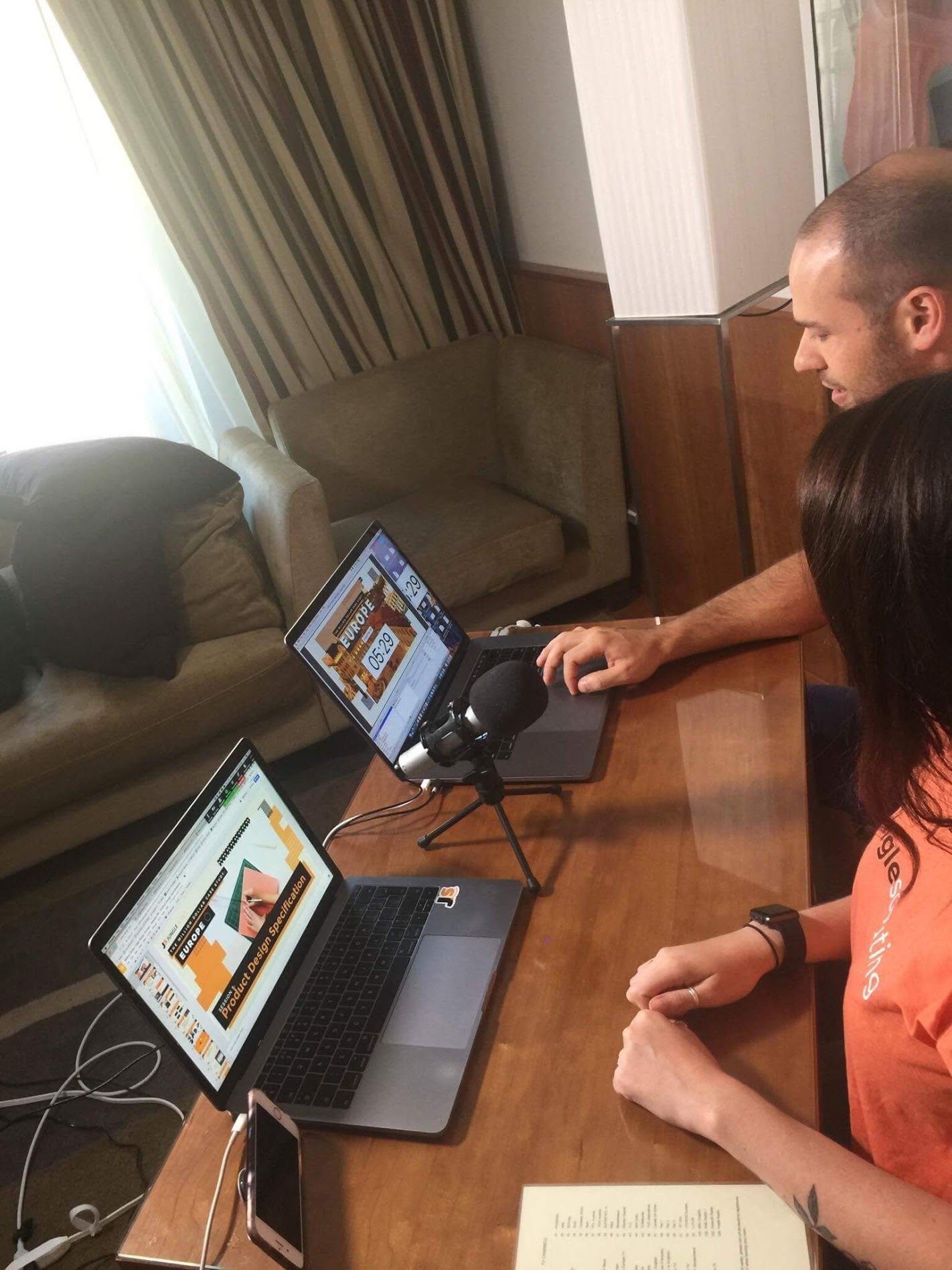

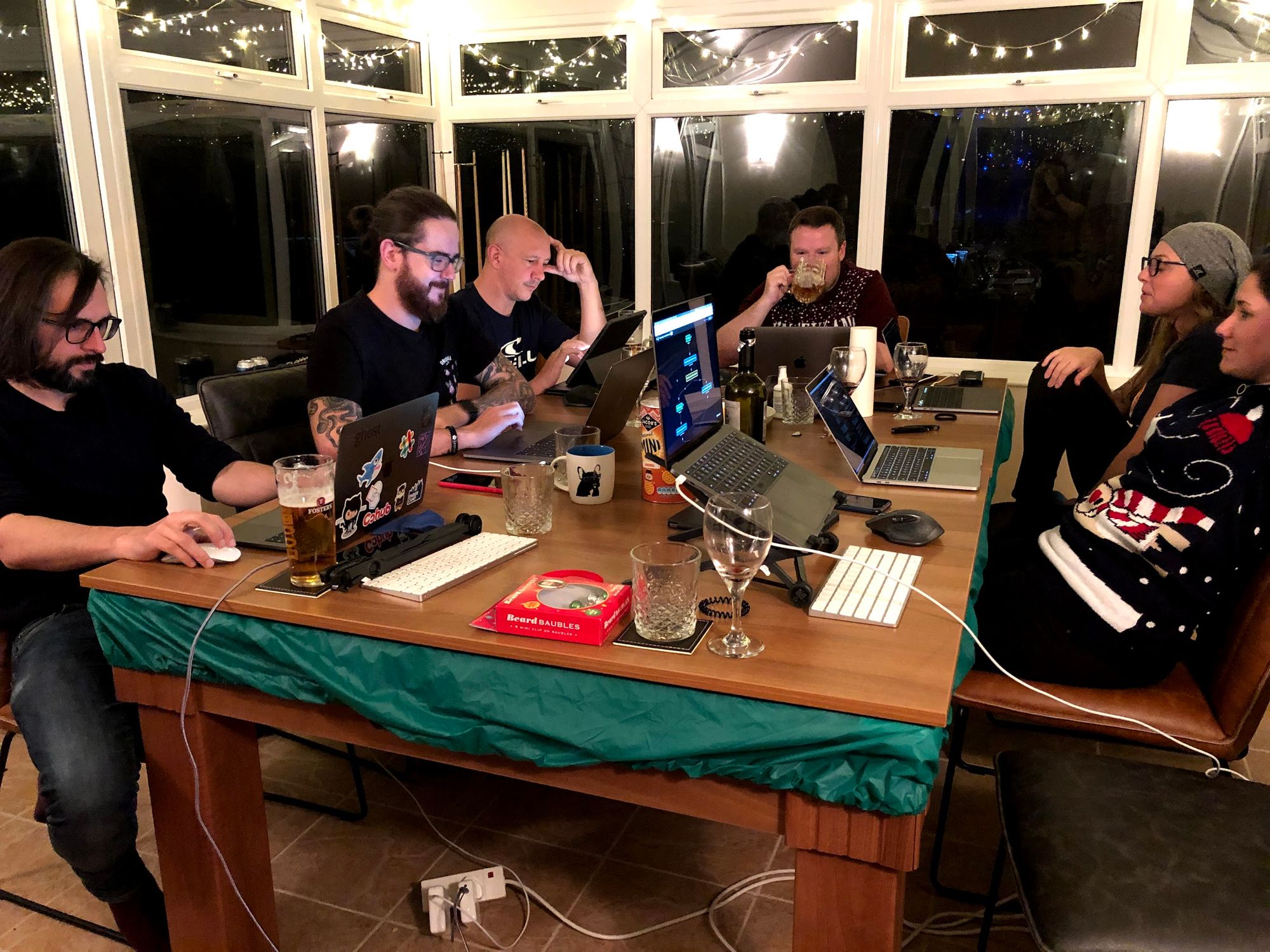
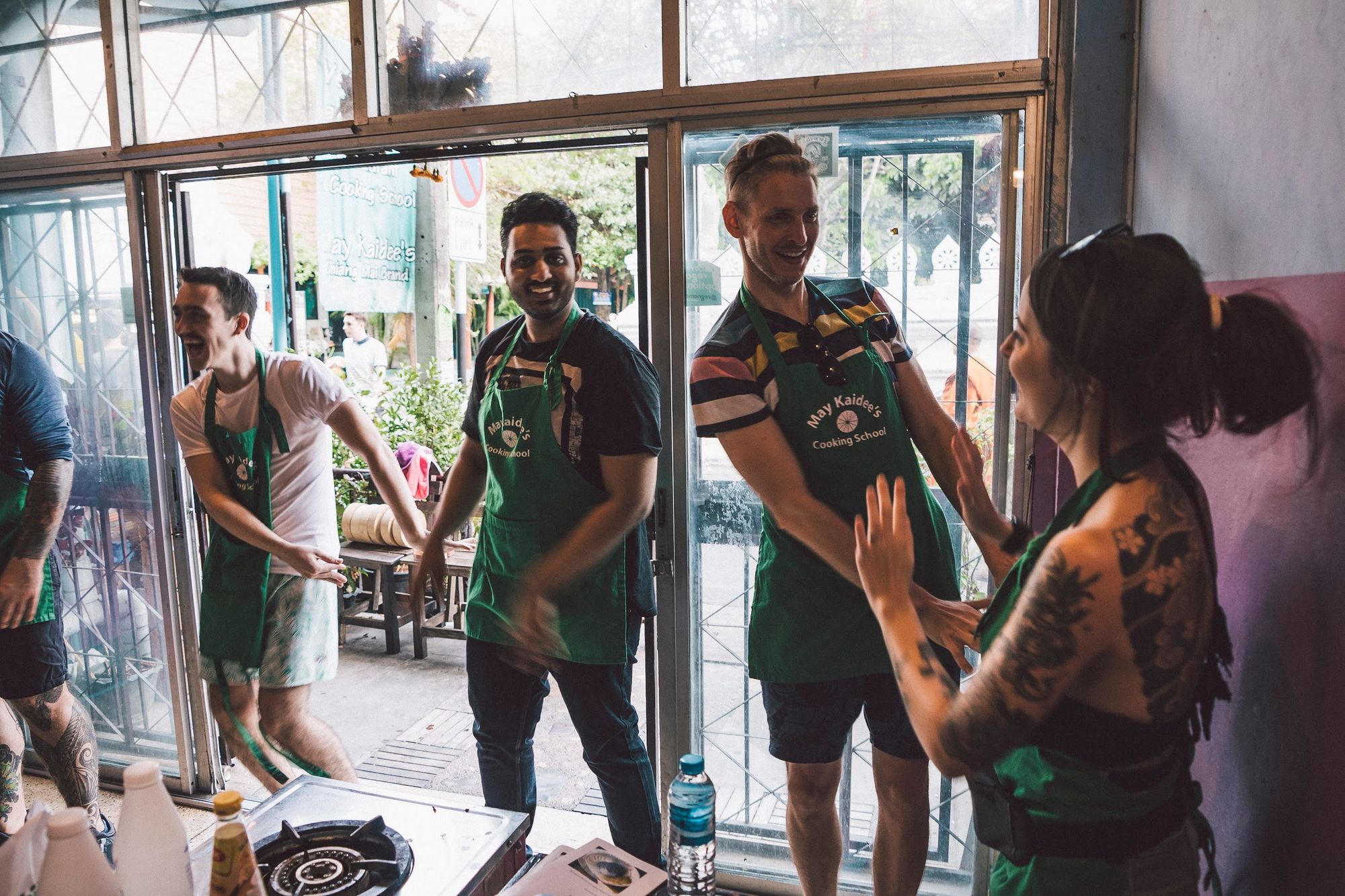

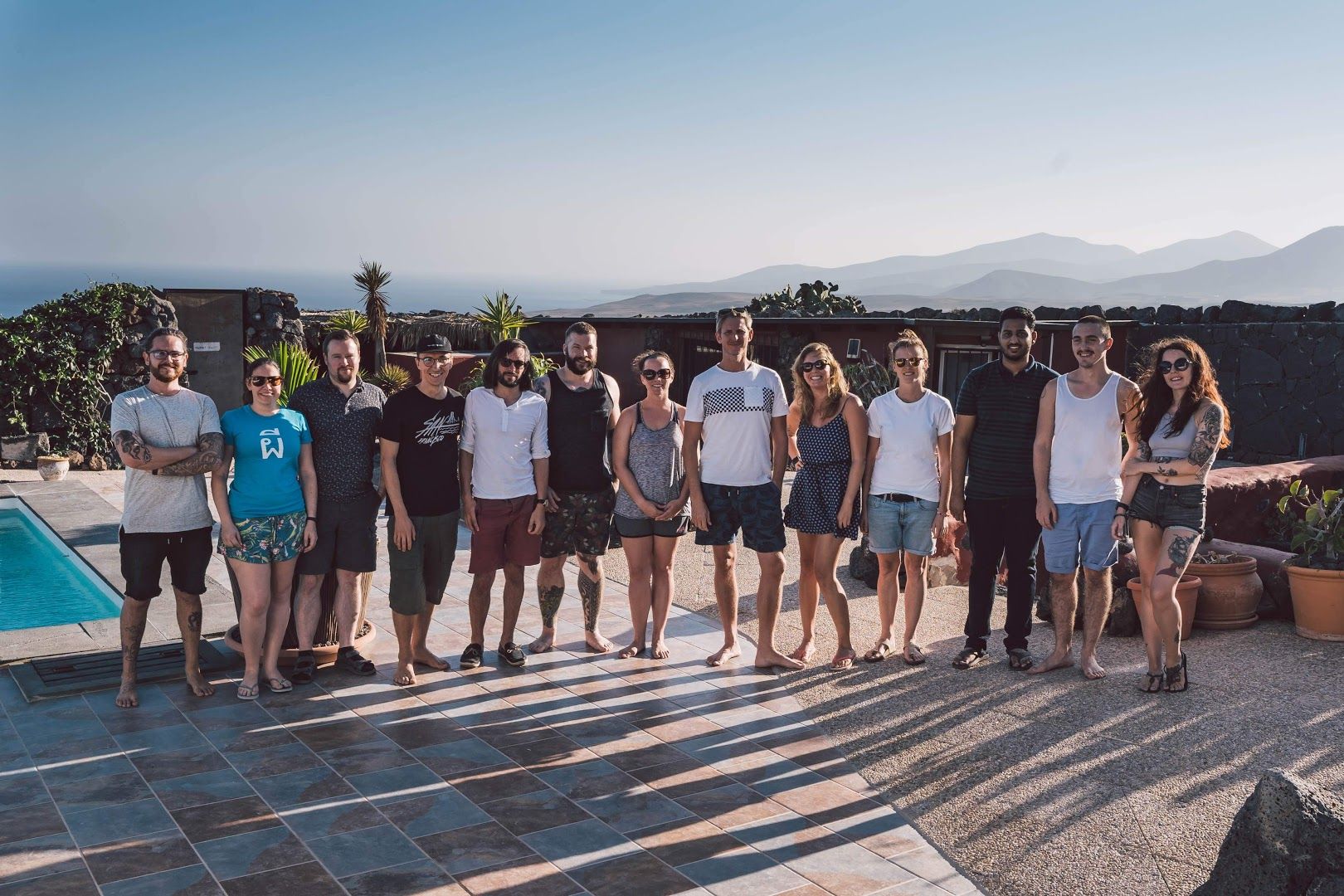

Other changes that often come with remote life are figuring out your taxes, health insurance and other boring but essential things. Most remote workers are hired as full-time contractors, and that usually means you're going to have to start filing your own taxes if you aren't already. I'm not able to dish out advice for this because it varies so much. Just don't forget to factor this in to your salary negotiations and if you're stuck, speak to a professional (accountant, lawyer). Is this stressful? A little. But it's not insurmountable, and I'm a firm believer that controlling as much of your own life as possible is a good thing.
There's lots more change that happens when you transition to remote. While this article has focused on how to get a remote job in marketing, it doesn't touch on a wide range of topics related to remote work in general that you might be interested in researching before deciding to take the plunge.
I've slowly adapted to all of these changes and discovered an incredible opportunity to grasp my own life by the horns. This type of lifestyle also comes with some sacrifices – a new set of problems to deal with. When I speak to people who have put in over 5 years of remote work, they're still working on it. But I honestly don't think I could ever go back to a "normal" office job.
/end ✌️
Always happy to chat about remote work / marketing / cats – drop me a line.


